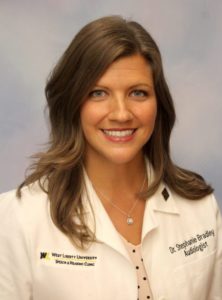
WEST LIBERTY, W.Va., Oct. 8, 2021 — West Liberty University Speech and Hearing Clinic urges the public to be aware of the importance of good hearing health.
“Since October is National Audiology Awareness Month, it’s a perfect time to remind everyone to protect your hearing and get it checked,” said Stephanie Bradley, director of the Speech Pathology and Audiology program in the College of Sciences.
The National Institutes of Health’s National Institute on Deafness and Other Communication Disorders states that approximately 28.8 million Americans could benefit from the use of hearing aids. While age is often cited as a factor, there are growing numbers of younger people reporting hearing difficulties.
A study published by the Lancet Commission on Dementia Prevention, Intervention and Care cited nine risk factors for dementia. Midlife, untreated hearing loss is listed as one of those risk factors. The report also stated that dementia typically starts many years before it is recognized. Untreated hearing loss can impact the brain and cognitive health.
“There is also a link between untreated hearing loss and falls,” Bradley said.
According to a study conducted by Johns Hopkins University School of Medicine, an increase in hearing loss in an individual, for instance going from normal hearing to an untreated mild hearing loss, is associated with a 3-fold increase in fall risk.
One of the factors in maintaining healthy hearing is being conscious of the degree and amount of loud sound exposure. More than 40 million Americans, aged 20 to 69, have some type of hearing loss with approximately 10 million of those attributable to noise-induced hearing loss. Managing sound exposure can protect hearing. Many hearing losses are caused by damage to the tiny sensory receptors, or hair cells, in the inner ear. The damage can be caused by too much noise, and it is permanent; however, steps can be taken to prevent this damage.
The simplest way to protect your hearing if you can’t avoid loud sounds is to wear hearing protection. An audiologist can help you identify the right hearing protection for you including custom hearing protection that can provide a comfortable fit and good sound quality.
The American Academy of Audiology states that lengthy or repeated exposure to noise above 85 decibels, can damage hearing. To put that into perspective, noise from fireworks can reach up to 155 decibels. A jet plane taking off is estimated to be 150 decibels. Shooting a gun is around 140-175 decibels (depending on the gun). An amplified music concert and an MP3 player with the volume turned all the way up can be as high (or higher) as 120 decibels. Movie action scenes in the theater have been known to reach 100 decibels. Outdoor sounds can pose a risk too. Lawn mowers are around 85 decibels and chain saws can be 115-120 decibels. Compare these with normal conversation that is around 60-65 decibels.
The four main ways for protecting your hearing are easily remembered by this list:
- E = Earplugs
- A = Avoid loud noises
- R = Reduce
- S = Shorten time in loud environments
“Anyone suspecting that his or her hearing has diminished, should see an audiologist and get tested as soon as possible,” Bradley recommended.
WLU offers both an undergraduate and graduate degree in the field of Speech Pathology and Audiology. The university also operates a Speech and Hearing Clinic that offers hearing and some language healthcare services to the public at a reasonable cost
For more information, visit www.westliberty.edu/shc or contact the clinic at 304.336.8199.
About the American Academy of Audiology
The American Academy of Audiology is the world’s largest professional organization of, by and for audiologists. Representing the interests of approximately 14,000 audiologists nationwide, the Academy is dedicated to providing quality hearing care services through professional development, education, research, and increased public awareness of hearing and balance disorders. For more information or to find an audiologist, go to www.howsyourhearing.org.